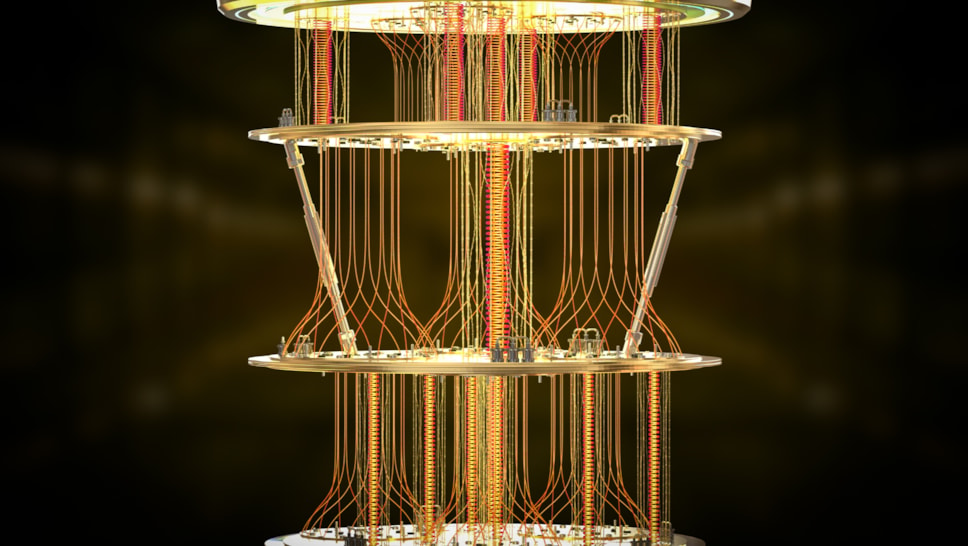
Into the quantum-verse: exploring the future of computing at E.ON
Quantum computing might sound like next-decade tech, but we’re already exploring how it could help us to forecast smarter, optimise faster, and build an energy system that’s ready for anything.
What do you get when you bring together a group of energy problem-solvers and a computer that operates colder than outer space? You get a window into the future – and a glimpse of how tomorrow’s technology could reshape how we power the world.
And at E.ON, we believe quantum computing could be part of the answer.
We’re working with IBM and global partners to explore how quantum technology could be embedded into the way we plan, operate and optimise our energy systems — from simulating complex infrastructure to managing demand more intelligently and responding faster to change. It’s all part of our drive to find new ways to improve outcomes for our customers and communities – and to explore how it might help us build faster, smarter, more resilient energy systems.
Quantum computing 101: What’s all the fuss about?
Most of today’s traditional computers work using binary logic — flipping billions of electrical switches on and off to represent data as 1s (on) and 0s (off). That’s great for many tasks, but it quickly becomes slow and inefficient when solving highly complex problems.
Quantum computers, on the other hand, use special units of information called qubits. Unlike traditional bits, qubits can exist in multiple states at once — similar to spinning a coin and having it land on both heads and tails at the same time. This allows quantum computers to look at countless combinations and variables simultaneously.
As a simple analogy, imagine searching a massive library. A traditional computer checks each book one by one. A quantum computer looks at every book at once. That kind of speed and flexibility opens up big possibilities for the energy world — and explores new potential for smarter forecasting, faster energy trading, and better system planning, where conditions are always changing and systems are deeply interconnected.
Turning quantum into real-world solutions
Across E.ON, we’re already exploring use cases where quantum or quantum-inspired approaches could make a real difference:
- Q-Grid: Helping local communities to work better by pairing up energy producers and consumers to balance supply and demand more efficiently
- EV flexibility: Scheduling vehicle charging and discharging to support the grid – with precision timing made possible by quantum optimisation
- Energy Contract Portfolio Risk Analysis: Rapidly assessing risks and responding to changing weather patterns, helping us to prepare for everything from storms to heatwaves
We’re also exploring quantum-inspired models – clever algorithms that borrow quantum techniques and apply them to today’s classical hardware, for example for Dynamic Pricing models.
Picking the right tool for the job
Quantum computing isn’t about replacing everything we do today — it’s about giving ourselves more advanced tools to solve the hardest problems of tomorrow.
That’s why we’re building a library of well-defined energy problems where quantum computing could make a measurable difference – based on business value, technical fit, and innovative thinking.
With ongoing work across academic and government networks, and a growing list of firsts under our belt, we’re already establishing ourselves as a front-runner in the quantum energy space.
UK spotlight: on the ground at IBM’s European Quantum DatacenterOur UK team joined colleagues from across Europe for a hands-on immersion at IBM’s European Quantum Data Centre in Stuttgart — home to “IBM Aachen”, a quantum computer housed in a state-of-the-art facility cooled to temperatures near absolute zero (even colder than space!). The visit was an opportunity to see the technology up close, build connections across teams, and deepen our collaboration with IBM as we explore how quantum computing can help us meet tomorrow’s energy challenges. Kara Flook, Emerging Technology Lead at E.ON UK, said: “Quantum computing still feels like something from the edge of possibility, but standing in front of one and discussing how it could help us solve real challenges made it feel suddenly tangible. It was exciting to explore where this could take us — not just in terms of innovation, but in how we deliver better, faster, more intelligent energy solutions for customers.” Dr. Corey O’Meara, Chief Quantum Scientist at E.ON Digital Technology, adds: “It was fantastic to visit the IBM Quantum Datacenter. I’m so happy to see the increased interest from our E.ON UK colleagues as we feel this is really a game-changing technology to leverage together. QC will enable internal and customer facing business models that are simply not possible using classical computers and I’m excited to explore further business opportunities together.” |

